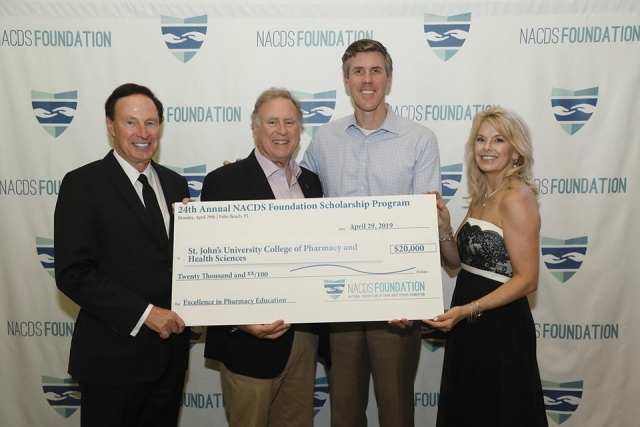
St. John’s University is one of only six colleges from across the nation to receive a scholarship for an initiative designed to boost access to quality health care for vulnerable and underrepresented populations.
The project provides students in the areas of pharmacy, physician assistant, public health, and potentially other allied health professions with the opportunity for experiential learning while they directly treat and interact with poor and homeless individuals.
The National Association of Chain Drug Stores bestowed the $20,000 award to the University’s College of Pharmacy and Health Sciences (CPHS) through the NACDS Foundation Scholarships for Excellence in Education, part of the organization’s ongoing commitment to impact community health in a significant way.
St. John’s CPHS will partner with the New Life Community Health Center to establish and expand health services to the local Queens, NY, community by developing the MOBILE Clinic—MOving through communities to Better lives using Interprofessional Learners and Educators.
“St. John’s University is one of the country’s most diverse institutions of higher education by virtue of being in Queens. In several Queens neighborhoods, many community members are immigrants who are uninsured or underinsured and lack access to health care,” said Manouchkathe Cassagnol, Pharm.D., BCPS, AACC, the lead investigator for the MOBILE Clinic project. She is also Associate Clinical Professor in the Clinical Health Professions Department, Assistant Dean of Service Programs, and Assistant Director of the Urban Pharmaceutical Care, Research, and Education Institute in CPHS. “Through this initiative, the College is able to serve the needs of our diverse community while upholding St. John’s Vincentian mission of helping those most in need.”
The clinic is scheduled to open by the spring semester; the focus will be on prevention and medication therapy. It aims to serve immigrants, the uninsured, and underinsured of western and central Queens. According to Dr. Cassagnol, 27 percent of the more than 188,000 residents of the local Queens neighborhoods of Elmhurst and Corona live in poverty, which contributes to limited healthy options and increasing difficulty in accessing health-care resources.
The MOBILE Clinic takes an interprofessional approach, where students work alongside faculty and New Life medical staff, including nurses, physicians, physician assistants, pharmacists, and public health professionals, as well as with social workers. In addition to providing one-on-one time with clinicians and faculty from whom they can learn and receive additional mentoring, the program offers students opportunities to conduct research.
